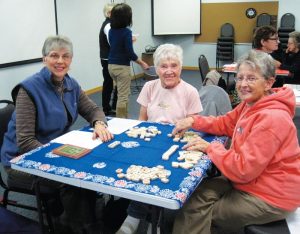 An early Boomer column ‘Mind Changes – When to Worry’ by Susan Tereba provided information on identifying dementia. The good news is that losing your keys is just age-relate memory loss, not dementia. We can actually delay memory loss and improve brain function indefinitely by adopting lifestyle changes and keeping the thinking box stimulated.
An early Boomer column ‘Mind Changes – When to Worry’ by Susan Tereba provided information on identifying dementia. The good news is that losing your keys is just age-relate memory loss, not dementia. We can actually delay memory loss and improve brain function indefinitely by adopting lifestyle changes and keeping the thinking box stimulated.
‘Use it or lose it’ refers to all the equipment we were issued with at birth… physical, sexual and mental. Inevitably it will all start to degrade over time. Hip replacements and Viagra can address the first two, but once our mental acuity disappears it can never be regained. After about age 60 the brain begins to shrink in size. After a lifetime of gaining accumulated knowledge, it becomes less efficient at accessing that knowledge and adding to it. I’m personally very aware of this slow shift; the mental filing system isn’t anything like as efficient as it used to be.
Several studies show a correlation between cognitive stimulation and continued cognitive health in seniors. Stretching our brains in new directions stimulates the grey cells and slows memory loss. Another important factor is social engagement. A study conducted by several leading cognitive scientists and published in The International Journal of Epidemiology found that participation in social activities outside the family may have a bigger impact on cognitive function than social contacts with family.
Keeping your mind sharp is largely a matter of common sense: eat lots of vegetables, don’t smoke, drink in moderation, exercise, read, hang out with your friends, learn new things, don’t sweat the small stuff.
 First of all, don’t buy into the stereotypes of aging and memory loss. My mother drove her car until she was 92 and my grandfather was still beating me at chess well into his 80s. In Indonesia we are technically geriatric at 60; we’re not allowed to donate blood after age 60 or apply for a new credit card after 65.
First of all, don’t buy into the stereotypes of aging and memory loss. My mother drove her car until she was 92 and my grandfather was still beating me at chess well into his 80s. In Indonesia we are technically geriatric at 60; we’re not allowed to donate blood after age 60 or apply for a new credit card after 65.
Remember when we were in our teens looking at older people? That generation of 65-plus expected to be old, so they mostly looked old and acted old. Our generation is very different. We are the Baby Boomers; not only are we not old, but we have attitude. I think that gives us an edge in the keeping-the-marbles department.
There are lots of things we can do to keep the brain agile.
Challenge your brain
According to the Harvard Medical School, challenging your brain with mental exercise is believed to activate processes that help maintain individual brain cells and stimulate communication between them. Learning a new language is a full-brain workout and also involves social engagement. If your Indonesian is not fluent, find a teacher or a class at your level. Cinta Bahasa in Ubud is excellent. If we live here even part of the time, it‘s only polite to speak the local language as best we can.
Playing games, especially those that involve memory and sequencing such as bridge and mahjong, are excellent for keeping the brain sharp. So are crossword puzzles.
Activate all your senses
The more of our senses we use in learning something, the more of our brain is involved in retaining the memory. So try tactile arts like ceramics or wood carving, cook new dishes, guess the ingredients of the dish you are eating.
Remove distractions
De-clutter your house and assign a permanent place for your keys, eyeglasses, purse and other often-misplaced articles.
Auditory discrimination becomes an issue as we grow older; sitting in a restaurant trying to talk to friends with traffic noise, a juicer buzzing, background music and other conversations going on around you can be very frustrating. Choose a quiet place to meet and don’t be afraid to ask the staff to turn the music down (tolong turunkan musik).
Have an active social life
Experts believe that social interaction requires us to engage areas of the brain involved in memory and attention, the same mental processes that are used in many cognitive tasks. Staying socially engaged may support brain health, and one study suggests that activities combining social interaction with physical and mental activity may help prevent dementia. So we can bundle this benefit along with mahjong, dancing and that moderate drinking mentioned earlier.
Repeat things
Repeat aloud what you’ve just heard, read or thought about and write them down to reinforce the memory or connection. If you place one of your belongings somewhere other than its usual spot, tell yourself out loud what you’ve done. Don’t repeat reminders often over a short space of time but space them out for best retention — remind yourself every hour or three. And don’t hesitate to ask for information to be repeated.
Exercise the physical body too
There’s an undeniable connection between the brain and the body. If you exercise your body, your brain will benefit. Both high and low intensity anaerobic and aerobic exercise can be beneficial for brain health. Even walking or cycling for 30 minutes a day reduces brain cell loss and can also significantly reduce the risk of heart attack, stroke, diabetes and other tiresome diseases.
Yoga is especially good because the mind is constantly engaged throughout the session. A word about yoga safety – there are many poor, even dangerous, yoga classes in Bali with large classes and under-experienced, disengaged ‘teachers’. Avoid flow classes unless you are very experienced. Seek a teacher who has small classes and pays careful attention to alignment and safety. Iyengar, Hatha and Yin are usually safe, slow yoga traditions with a focus on alignment.
Dancing is another excellent way to move the body and the brain, especially salsa, tango, line dancing or anything with complex steps. When we dance our brain releases endorphins, neurotransmitters that create a feeling of comfort, relaxation, enjoyment and power. Music and dance activate the sensory and motor circuits of our brain and also the pleasure centers.
Listen to Music
A study in the journal Neuron showed that listening to music may sharpen the brain’s ability to anticipate events and stay focused. I find choir very mentally stimulating, especially since I don’t read music and have to memorise the different parts (often in foreign languages) while managing breathing and voice technique and watching the choir leader. It’s a workout.
Above all, perhaps, keep your sense of humour and find the light side in the darkest situation. When we’re down to our last few marbles, we’re going to need all the laughs we can get.
By Ibu Cat
The Boomer Corner is a column dedicated to people over 60 living in Bali. Its mandate is to cover topics, practicalities, activities, issues, concerns and events related to senior life in Bali. We welcome suggestions from readers.
E-mail us at : Baliboomers@gmail.com
Copyright © 2019 Boomer Corner
You can read all past articles of
Boomer Corner at www.BaliAdvertiser.biz